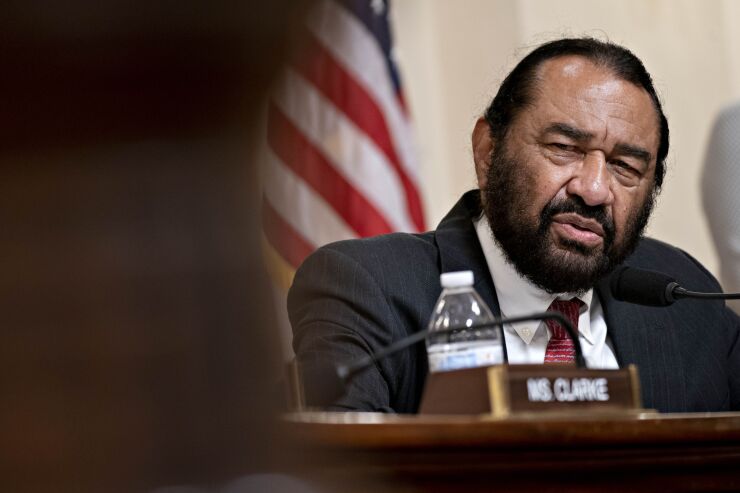WASHINGTON — Lawmakers clashed Thursday over whether mortgage servicers' recent handling of forbearance requests complies with the Coronavirus Aid, Relief and Economic Security Act.
The CARES Act allows borrowers with a federally backed mortgage to request up to
At a subcommittee hearing of the House Financial Services Committee, Democrats tried to get to the bottom of why some borrowers reported not being made aware of their options and having difficulty obtaining forbearance for the permissible period. Some servicers are said to be placing borrowers in shorter 90-day plans.
Lawmakers accused servicers of not taking the law seriously enough.
“This program that we established in Congress has been received by the persons who are charged with recording these forbearance agreements— the servicers — it has been received by them as an honor system,” said Rep. Al Green, D-Texas, chairman of the subcommittee on oversight and investigations. “We never intended for this to be an honor system.”

Yet others, including Rep. Andy Barr, R-Ky., view the forbearance component of the CARES Act as largely a success story.
“This shows that in times of crisis the government and the private sector can work together, and that the private sector has acted responsibly, in the interest of homeowners without having government mandates imposed on them,” he said.
According to
Rep. Nydia Velazquez, D-N.Y., pressed the four witnesses testifying at the hearing on whether or not servicers were communicating misleading information to borrowers about their repayment options, and if that was discouraging borrowers from asking for forbearance in the first place. However, the witnesses did not include any representatives from a mortgage servicing company.
“Do you feel misinformation about repayment options is discouraging borrowers from accessing the forbearance relief afforded to them under the CARES Act?” Velazquez said to the witnesses, who included a housing counselor, real estate industry representative and consumer advocate.
The CARES Act did not specify how or when borrowers would make skipped payments after a forbearance period ends, but numerous agencies and some servicers have suggested homeowners can wait the whole the life of the loan and that missed payments can be made up all at once.
“The people that we talk to are frazzled about this lump sum payment,” said Marcia Griffin, founder and president of HomeFree USA, a nonprofit housing counseling service. “It's causing a lot of undue headache in these communities, and the borrowers are really concerned about their ability to pay even at some point.”
Donnell Williams, the president of the National Association of Real Estate Brokers, even suggested that Congress provide for television and radio advertisements to make borrowers more aware of their ability to request forbearance and their rights in making up payments.
“I think that servicers need to get the information out of the borrower's rights, out to the community and to the borrower… and we also need to have data collection services need to supply this information and data to the [Consumer Financial Protection Bureau] and to Congress,” Williams said.
Much of the discussion at the hearing also centered on the Democrats' ambitious Health and Economic Recovery Omnibus Emergency Solutions Act — or HEROES Act. The additional proposed stimulus package to address economic effects of the pandemic
The bill would amend the previous stimulus package so that borrowers of most single-family loans — even if they are not government-backed — would be eligible for forbearance for up to a year. The bill would also automatically put any borrower who became delinquent after March 13 into a 60-day forbearance plan once that borrower misses a mortgage payment for 60 days.
“More borrowers are not paying their mortgages than are making forbearance arrangements with their servicers, according to the U.S. Census Bureau,” said Alys Cohen, a staff attorney at the National Consumer Law Center. “People who are already late on their mortgages have taken the hit on their credit, and they shouldn't face foreclosure and they should get more assistance.”
However, Barr called the provision allowing for delinquent borrowers to automatically be put into forbearance plans unnecessary, and expressed concern that it could limit a borrower’s options.
“Apparently the authors of the HEROES act believe that instituting mandatory automatic forbearance for all borrowers and limiting loan modification options will benefit borrowers,” he said.
Ed DeMarco, the president of the Housing Policy Council and former acting director of the Federal Housing Finance Agency, agreed with Barr that automatic forbearance plans could end up hamstringing borrowers.
“The idea of making sure the servicer is actually staying in contact with their customer and the customer staying in contact with the servicer is going to yield a better outcome for the various situations that we're going to see here,” he said.
DeMarco also highlighted the transition borrowers will have to make after their forbearance period ends, and emphasized that “forbearance to post-forbearance repayment is not a one-size-fits-all proposition.”
Cohen pushed for the next round of fiscal stimulus to include legislation that would help transition borrowers into repayment plans.
“At this point, what we'd like to see and what's in the HEROES Act and could be in Senate legislation are more affordable post- forbearance repayment options that are mandatory,” she said.





